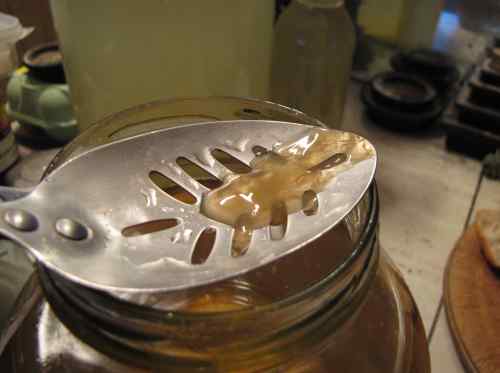Trying to get away from navel-gazing and back to writing about growing things and making things, here's a post that turns a saccharine-sweet motto on its head.
Last year I used bread yeast to make all my wines, with varying success. Some of them came out just fine, but several of them were far too sweet. The yeast just gave up and died before it had turned very much of the sugar into alcohol. I'm thinking of just adding some wine yeast and hoping it'll get started again, but in the meantime, it occurred to me that I could do with some decent vinegar for pickling samphire.
The cider vinegar that I made last year developed a quite convincing-looking vinegar mother. I poured all the vinegar into a jug so I could scoop out the mother before returning the liquid to its bottle.
I've chosen to use about half a gallon (that's a British gallon, so about two litres) of sweet beech leaf wine. I poured this into a large jar, plopped the vinegar mother in on top, covered it with a bit of old net curtain (it's important to allow air in, but not bugs and breadcrumbs and other things that might find their way in there in my kitchen), and added it to the general clutter on my kitchen worktop.
At about this point in writing the blog post, I looked up instructions for how to make vinegar. The first useful tip I found was that vinegar can only be made in the dark, so I added a newspaper sleeve to my jar. I then got a bit concerned by the fact that all the instructions described a two-stage process, adding yeast first to make wine, and only then adding the mother to convert it into vinegar. I was sure I remembered methods involving putting apple peels in a jar of water and leaving them... I found them again and even these seemed to assume that the yeast would get to work first and the bacteria would move in later.
Hmm, maybe all that sugar wouldn't get converted. I sought advice on the 'ish forum, and the suggestion was that a vinegar mother would probably eat just about anything, so I left it alone to see what would happen. After a few days I couldn't see anything happening, so I bottled out and added a bit of yeast (wild, probably still alive). About a day later, I saw a film forming on the surface, which is a good sign for vinegar. Whether the yeast had anything to do with this or not, I don't know, but I'm happy that something is happening.
I can expect this to take a few weeks, at least, to make vinegar. I won't ignore it completely, though, I'll keep sniffing it from time to time because after the vinegar's made, with continued access to oxygen, the vinegar mother will eat right through the acid, leaving only water. I think that's happened to a batch I tried before, which was very disappointing. Now at least, I know to watch out for it, and seal my vinegar into bottles before it goes over.
A note on using homemade vinegar for pickling: Most guides advise not to. This seems over-cautious to me. With the quantity of sugar I had in here, I was aiming for about 12% alcohol. Converting the alcohol to acid actually increases its concentration (oxygen is added to each molecule, making it relatively heavier), and the minimum required for pickling is 5%, so surely this vinegar is going to be plenty strong enough, even if it does go over and lose a bit.




